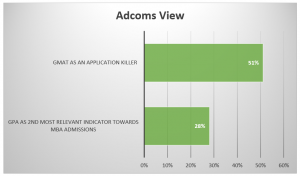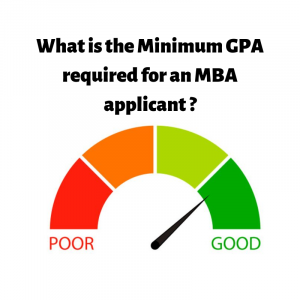When the question arises about the importance of GPA in MBA Admissions process, then we would say its an important aspect that you need to keep an eye on! Your undergraduate GPAs has 10% weightage in your MBA application. Along with your GMAT score, your GPA also plays a vital role and helps the Adcoms (Admission committee) to evaluate you based upon statistical data. So, if you have scored a low GPA, then you can compensate it by doing well on the GMAT, but the opposite might raise a few questions.
Why is that you ask?
Let us discuss a bit more about the importance of GPA in MBA admission process and how you can compensate for a low GPA.

In this article, we will discuss the following parameters:
- Importance of GPA in MBA Admission Process
- Minimum GPA required for MBA Admissions
- How can you compensate for a low GPA in MBA Admissions?
- Key Takeaways
If you are planning to take the GMAT, we can help you with a personalized study plan and give you access to quality online content to prepare. Write to us at acethegmat@e-gmat.com. We are the most reviewed GMAT prep company on GMAT club with more than 2400 reviews and are the only prep company that has delivered more than 700+ scores than any other GMAT club partner. Why don’t you take a free trial and judge for yourself?
Importance of GPA in MBA Admission Process
While applying for an MBA, the admission committee will be keen on knowing what kind of student you are. They will be interested in knowing which modules interest you and which ones don’t. Overall, they will be keen on knowing how you had performed as a student.
Here’s where your GPA will come into the picture.
GPA (Grade Point Average) will help them in determining your past academic performance and will build a foundation towards how well you will do in future academic areas. Your GPA will help in portraying an image of you as a prospective student and to what extent you would be able to tackle the rigorous MBA curriculum.
Thus, your undergraduate GPA matters a lot and will be taken into consideration while determining whether you have a chance of getting into a highly reputed Business Schools or not.
But hold on, there are ways in which you can compensate for your low GPA.
Lets first talk about the other parts of your MBA application that are equally important.
Components of MBA Application
Listed below are the six components of MBA application:
- GMAT Score
- Work experience
- Letter of Recommendations
- Essays
- Extra-curricular activities
- Awards and achievements

As stated earlier, GPA and GMAT are the two key parameters that help the Adcoms in evaluating an applicant on quantitative bases. Based on these two components, Adcoms can indicate how well you will do when it comes to academic readiness.
According to GMAC, the results of your GMAT exams are more accurate in predicting your success in an MBA program than GPA.
So, if you have a slightly low GPA, you can compensate it by doing better on the GMAT test. But, having a low GMAT score will raise a few questions, as GMAT scores have more weightage than GPAs.
The Kaplan Test Prep survey of B-school Adcoms showed that a low GMAT score is the biggest reason to turn down an MBA applicant. 51% of the admission officers agreed with the same, whereas 28% pointed out a low undergraduate GPA as the second most relevant indicator towards MBA admissions.

Thus, Adcoms will take into consideration both your GPA and GMAT scores and will not be okay with you scoring below the average GPA unless you perform well on your GMAT or give them a reasonable explanation regarding your low GPA scores.
For Instance,
“I was working full time in addition to taking my undergraduate classes, due to which I have a lower GPA as compared to other students.”
Other areas where your GPA plays an important role:
During your master’s program, you will be asked to provide your GPA in many instances, such as for:
- Scholarships
- Joining an organization or club
- Applying for your PhD
Have a Low GMAT score? Learn How to overcome low GMAT score.
Minimum GPA required for MBA Admissions

There is no minimum GPA requirement for MBA admissions. Most of the top business schools like Harvard and Stanford, do not mention a minimum score for GPA requirement for admissions. However, the average GPA for both the schools is 3.71 and 3.73, respectively.
The average GPA of incoming MBA students of the top 50 business schools ranges from 3.2 -3.73.
Having said that, any business school would never want to miss out on any of the brilliant applicants, who didn’t score well in their GPA but scored high on GMAT with excellent work experience! Thus, GPA is an essential number for Adcoms, but they look at your whole application.
Begin your GMAT preparation with the only prep company that has delivered more 700+ scores than any other GMAT club partner. Achieve GMAT 740+ with our AI driven tools that you personalized feedback at every step of your GMAT journey. Take our free trial today!
Let’s look at the views of the admissions committee members and consultant towards the same:
- Jessica Chung, Ex-associate Director for MBA admissions at UCLA Anderson, highlighted that the MBA applicants should not see themselves as a number. GPA/GMAT is a significant portion of the application, but it’s a holistic application process.
- Duke University Admission committee member Lauren Sutherland, highlighted that:
“If you are worried about your academic component, then you can send supplementary information, where you can provide details regarding any additional courses related to the MBA program that you have taken.”
- Karen Marks, the admission consultant of North Star Admission consultancy, stated that she had helped clients with GPA’s as low as 2.4 get into top-10 business schools.
- Tuck admissions committee answered a very relevant question, i.e. For an undergraduate student studying at MIT or Berkeley, it will be a harder curriculum than the other schools, leading to a lower GPA. How will the Adcoms evaluate the same? To which they replied:
” We look at the entire application holistically, including academics, considering the rigor of the program, outside forces(work, extracurricular activities, personal circumstances, etc.)”
So, even if you have a low GPA, there are various other ways you can prove yourself to the Admissions Committee.
How can you compensate for a low GPA in MBA Admissions?

If you a low GPA, you can compensate the same by showcasing the other components of your application, such as:
- GMAT Score: As pointed out by Lauren Sutherland, you don’t have control over your undergraduate GPA, but you can leverage your low GPA by doing well on your GMAT.
- Taking Additional course work: As GPA helps the admission committee to understand your academic credentials, preferably taking statistical and quant-based courses that can justify your low GPA will be beneficial.
For Instance, “As stated by Lauren Sutherland, you can take online courses such as MBA MEC, that provides you with a series of modules that makes you get ready for an MBA.”
- Work experience: As recommended by Jessica Chung, highlighting those quantitative and analytical work experience that you have done will help in leveraging your low GPA.
She says, “Business school is a practical degree, so you want to make sure that you highlight that you can do well in analytical situations.”
Key Takeaways:
- GPA is an important component of your MBA application, but not the only one
- You can leverage your low GPA by scoring more on your GMAT test
- Business schools look at the overall application, and thus, there are various ways in which you can leverage your low GPA
- There is no minimum GPA for MBA applications
Do you have a low GPA? A 740+ GMAT score can improve your chances to get admitted in top business schools. Start your GMAT preparation by Signing up for our free trial!
We are the most reviewed GMAT prep company on GMAT Club with more than 1850 reviews.















